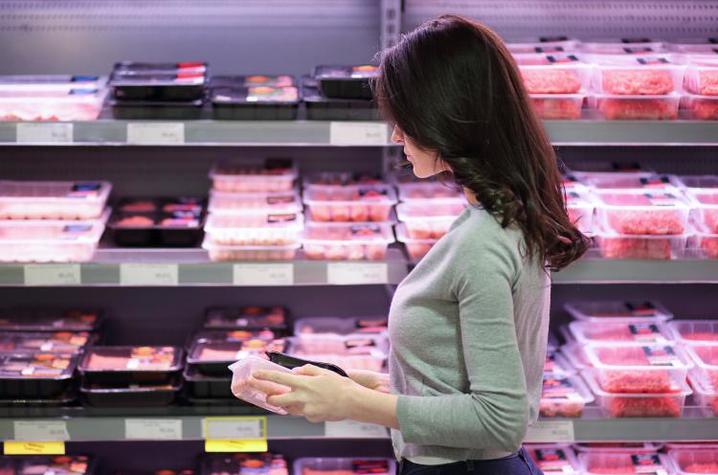Meat Scientists Answer Consumer Questions Related to COVID-19

LEXINGTON, Ky. (April 28, 2020) — Consumers have raised questions about meat supply and safety during the COVID-19 pandemic. To help them sort through the information, meat specialists from three land-grant institutions recently joined forces to offer practical, science-based answers.
Many of the questions revolve around food safety and the concern that humans could get COVID-19 by eating meat that was handled by a worker who has the virus.
“There is currently no evidence of the disease being transmitted through meat,” said Gregg Rentfrow, meat scientist with the University of Kentucky College of Agriculture, Food and Environment. “COVID-19 is a respiratory disease caused by a coronavirus, and it is transmitted through personal contact.”
Consumers should follow proper food safety measures and make sure to cook meat to recommended temperatures. A good guide for safe cooking temperatures is available at www.foodsafety.gov/food-safety-charts/safe-minimum-cooking-temperature.
Another question the specialists are dealing with is the possibility of consumers getting sick by handling food packages.
“We’re being asked if consumers can contract the virus by touching packaging that may have been handled by a food service worker testing positive for COVID-19,” said Jonathan Campbell, meat extension specialist for the Penn State College of Agricultural Sciences. “The Food and Drug Administration and the U.S. Department of Agriculture say no. The FDA also says you don’t need to wash your food containers to prevent COVID-19 infection.”
Campbell said the best way for consumers to protect themselves is by thoroughly washing their hands before and after handling food packages.
“Never try to wash meat in the sink or spray it with chemicals, or dip food into a cleaning solution,” he added. “Common household cleaners are not meant to clean our food.”
Consumers are concerned about plant closures due to workers at the plants contracting COVID-19. Rentfrow said he and his colleagues from Penn State and Ohio State University are trying to soothe consumer anxiety about the supply chain.
“We want to emphasize that the meat industry is devoted to maintaining the food supply,” Rentfrow said. “Although some plants have temporarily closed and others have slowed production, the meat industry began preparing for these interruptions before they began, and I’m confident things will get back on track soon.”
At Ohio State University, extension meat science specialist Lyda Garcia added that those meat plants that have closed are deep cleaning, so they can reopen as soon as possible.
“They are going beyond normal cleaning and sanitizing,” she said. “They are working with their local and state health departments to get back to normal as soon as it is safe to do so. Consumers don’t need to panic buy or stock up on meat, rather just try to maintain their traditional buying patterns.”
Overall, total meat sales have declined across the United States, but retail sales continue to increase. Temporary restaurant and food service establishment closures have caused the overall decline.
“The industry is working with the USDA-Food Safety and Inspection Service to redistribute meat products previously intended for restaurants and food service to meet retail grocery store needs,” Rentfrow said. “They are all working together to make sure the food supply is safe, and that consumers are able to get the products they desire.”
Some meat plants have reduced production, while they try to put social distancing and other measures in place to protect their workforce. Many are staggering their shifts, breaks, lunch times and even taking employee temperatures.
“They are doing everything they can to keep their workers safe and to ensure a safe product for the consumer,” Campbell said. “Some plants are going above and beyond and doing overall health assessments for each worker at the beginning of each shift and also requiring them to wear masks, gloves and eye protection.”
Most plants are continuing to pay ill workers while they recover at home.
Meat inspection is already mandatory, by law. Meat inspectors are present in all processing facilities.
“We want to help consumers understand that the meat industry as a whole, really does hold consumers safety as a top priority,” Rentfrow said. “Everyone is doing their best to make sure food is safe and plant employees are well and ready to work.”
Consumers can do their part by avoiding overbuying.
“We can work together to make sure everyone has enough,” Garcia added.
As the state’s flagship, land-grant institution, the University of Kentucky exists to advance the Commonwealth. We do that by preparing the next generation of leaders — placing students at the heart of everything we do — and transforming the lives of Kentuckians through education, research and creative work, service and health care. We pride ourselves on being a catalyst for breakthroughs and a force for healing, a place where ingenuity unfolds. It's all made possible by our people — visionaries, disruptors and pioneers — who make up 200 academic programs, a $476.5 million research and development enterprise and a world-class medical center, all on one campus.




